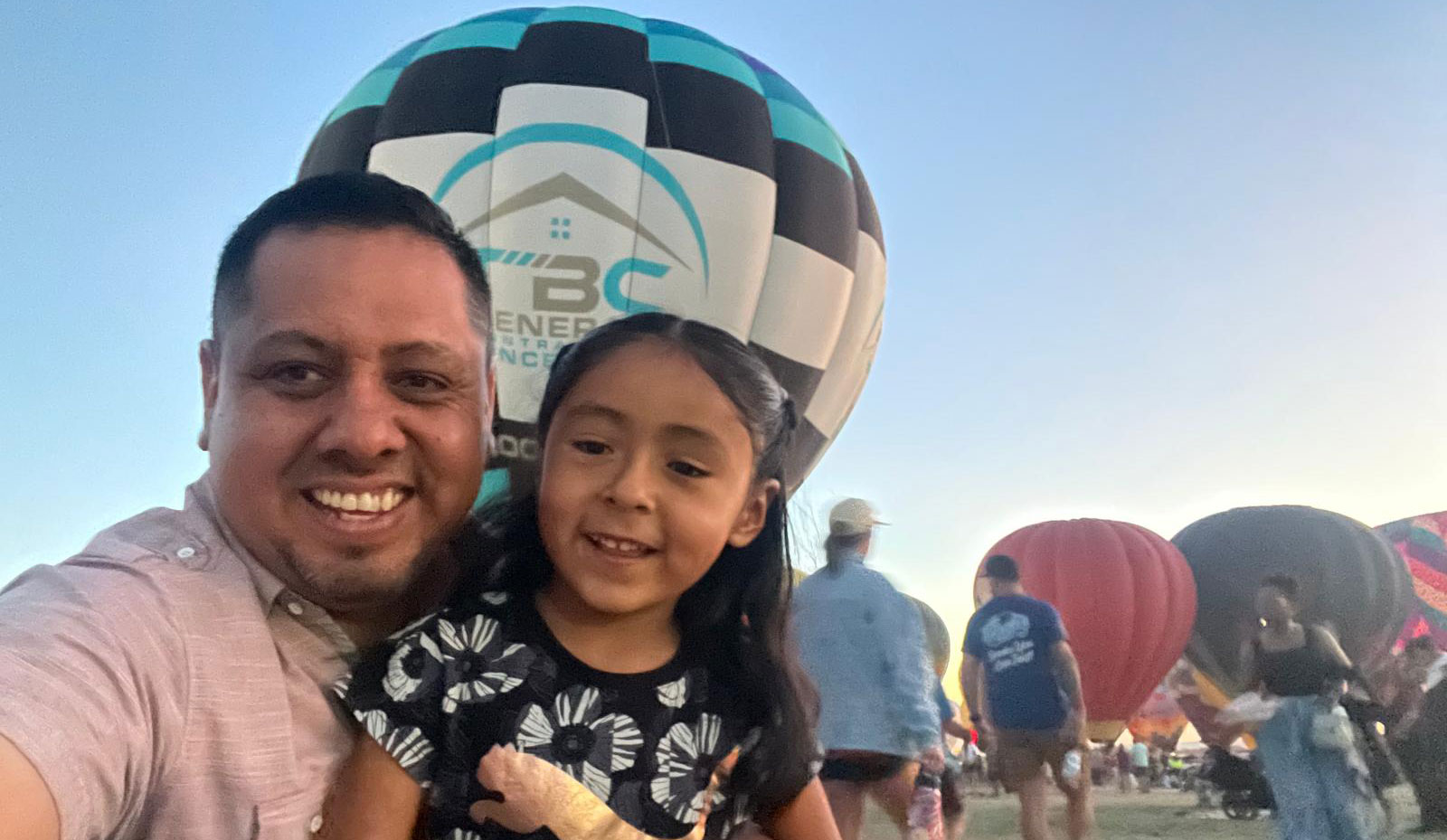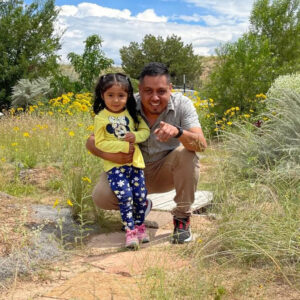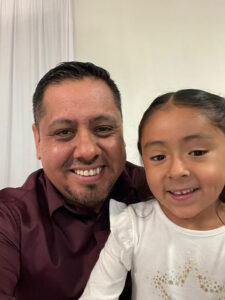‘The Chilling Effect’ and Fostering Hope in Immigrant Communities

Since the start of President Trump’s second term, Hector Aveldaño has seen the impact of the administration’s hardline immigration rhetoric in more places than one.

Hector Aveldaño poses with his daughter, Julianna, on a high-desert walk. Hector, who immigrated to the United States with his family at the age of 9, is a recipient of Deferred Action for Childhood Arrivals status.
The Albuquerque, N.M., father sees it in his personal life when friends and family members cancel out-of-state trips and avoid venturing into the city for fear of U.S. Immigration and Customs Enforcement (ICE) agents. He sees it at Fathers New Mexico, the nonprofit mentorship and advocacy program where he works as a case manager, when clients hesitate to file police reports, settle custody battles in the courts, or seek crucial social supports, like food stamps and Medicaid, for their families.
“It’s getting weird out here,” he says. “People need help, need assistance, need resources, and a lot of people are afraid to get them right now.”
Hector’s observations align with a troubling trend, known among researchers as “the chilling effect.” During the first Trump administration, faced with the threat of mass deportations and heated anti-immigrant sentiment, some immigrants avoided important aspects of daily life. They stopped going to the doctor, filing police reports, and, in some cases, going to work. Survey results from the 2025 National Latino Family Report show the chilling effect is alive and well during the president’s second term — and has the potential to cause long-term damage to communities across the country.

When asked which activities they might avoid due to the president’s mass deportation plans, Latino parents responded:
35%
32%
30%
27%
26%
25%
24%
A Dream, A Family
Hector is a father, an advocate, and a homeowner who went to college and pays his taxes. He’s also a proud Dreamer. Born in Monterrey, Mexico, he immigrated with his family at the age of 9, and he’s one of more than 530,000 immigrants brought to the United States as children who have completed their education here and been awarded the right to stay and work. Hector applied for, and received, Deferred Action for Childhood Arrivals (DACA) status a year after the act’s passage in 2012.

He didn’t plan to have children, but now Hector Aveldaño can’t imagine his life without 6-year-old Julianna. At a time when anti-immigrant sentiment is intensifying, Hector says he’s leaning into family and planning as best he can for an uncertain future.
Hector sees his three decades here as a shining example of the American Dream. He has set down roots and worked hard to support his family, including his partner Gladys and their 6-year-old daughter, Julianna.
“I wasn't planning on having any kids, and now that I have my daughter, I don't see myself without her,” he says. “In my family and in the Hispanic community, parenting is something we love doing. We love our kids. Life right now is a challenge, and it doesn't seem to be getting any easier, but I think our mentality of really being there for our kids is what's going to help us get through the next several years and beyond.”
Hector doesn’t spend too much time dwelling on it, but he knows his own protection is not guaranteed. He is like the majority of Latino parents who say anti-immigrant rhetoric is causing them concern. In this year’s survey, 57% of parents reported the administration’s policies caused them to worry that friends and family members would be deported. (Among Latino immigrant respondents, 74% said they were very concerned.)
That worry can have damaging long-term effects on the nearly 19 million children in the U.S. who live with an immigrant parent. During President Trump’s first term, pediatricians and parents reported that children of immigrant parents struggled with sleeping or experienced depression and anxiety. Additionally, about 1 in 3 parents in this year’s survey said they’d avoid enrolling their child in school or early childhood programs due to this administration’s mass deportation plans.
The Power of Hope
When Julianna was 1, Hector signed on with Fathers New Mexico and immediately found it rewarding to work with other parents, many of them immigrants like himself. Alongside his professional training, his experience attending rallies in support of immigration reform and organizing on behalf of Dreamers like himself imparted key skills, like knowing his rights and how to protect himself against unlawful detention.

Hector Aveldaño helps daughter Julianna display her graduation certificate.
Thanks to his training and his background in activism, when his clients express the kind of worry that results in the chilling effect, Hector knows how to reassure them.
Empowering parents to be their own advocates — and to advocate on behalf of their children — helps communities stay strong through adversity. But that’s only part of the challenge. Hector says a shift in mindset is critical to his community’s ability to weather this stretch of time.
Lately, Hector’s immigrant neighbors and friends have started echoing the kind of unwelcoming messaging that plays into the hands of the powers that be.
“They say, ‘Well, this isn’t our country. We knew this when we came here, so if we have to go, we have to go,’” he says. “It sucks seeing people being that afraid even if they’ve been here 20 years and have done everything right.”
Aside from the fact that a Hispanic community has existed in the United States since long before the nation’s formation, Hector says it is important for families to stay hopeful and focus on the future.
“Whether it’s us, now, in 2025, or our grandparents in their little town in Mexico, it’s always going to be challenging,” he says. “We just have to keep trying to make sure our kids have better and more opportunities than we had.”
